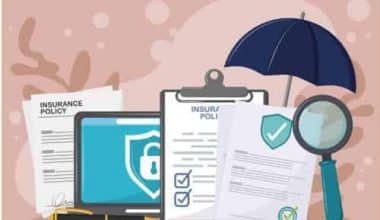You need self-employed business insurance if you run your own business. This is because the freedom that comes with being your own boss has its challenges—whether you’re a freelancer, 1099er, or “solopreneur.” Aside from drumming up deals and juggling clients, you’re also going to need to safeguard your business from financially disastrous problems like accidents, damaged business property, and lawsuits.
Think of it as a custom-made small business insurance policy that has all of the essential coverage types to protect your particular business from its unique risks.
What does self-employed business insurance cover?
A good self-employed insurance policy has several different types of small business insurance that cover a range of problems. These include lawsuits against your business, lost income due to problems covered by your policy, and damage to your business property.
When you’re putting together a self-employed insurance policy, you may want to start by looking at a business owners policy (BOP). A BOP bundles three foundational coverage types, and it’s usually a more affordable way to buy business insurance rather than purchasing these coverages separately.
Here’s what a BOP includes:
Business liability insurance
This covers property damage and bodily injuries caused to others (not including your workers). For example, if you run a food catering business and a guest burns themselves on a chafing dish, general liability insurance can cover the person’s medical expenses.
Liability insurance also pays for your legal costs, settlements and court judgments if you’re sued because of an accident.
Business interruption insurance
If a problem covered by your policy causes you to close your business temporarily, business interruption insurance replaces lost income. For example, this would replace your lost earnings if a fire at your business location caused a temporary closure. It also covers money lost due to damaged merchandise and the cost of moving to a new location on a temporary basis.
This coverage is also called “business income insurance.”
Commercial property insurance
This covers your business equipment and your business location if it’s damaged due to a problem covered by your policy, such as a tornado. Examples of items covered by commercial property insurance include both owned and leased items, such as computers, office furniture, inventory, supplies, valuable papers and business records.
What self-employed insurance does your business need?
Many businesses share similar characteristics, but it’s the little details that set them apart. Since every business is different, their insurance needs are also unique.
Self-employed insurance typically includes:
General liability insurance
General liability insurance is the first type of business insurance most self-employed business owners purchase. If you already crossed that one off your list, good for you.
While sometimes called “slip and fall insurance,” general liability covers situations where your business may be responsible for an accident that injured someone or damaged property that doesn’t belong to you. Often, you can’t get hired or start jobs without providing a certificate of insurance with active general liability coverage for your business.
Commercial auto insurance
If you’re doing anything other than making the occasional coffee run, you might not be covered by your personal auto policy if you drive for business reasons.
Commercial auto insurance can help cover expenses if you get into an accident while driving to meet clients, drop off equipment, make deliveries and a variety of other tasks you might be doing behind the wheel during your workday. Just like your personal auto insurance, commercial auto will cover injuries or property damage if you get into an accident at work.
Errors and omissions insurance
You’ve probably heard horror stories of an unruly customer who turns a minor disagreement into a full-blown legal battle. It happens in almost every industry.
If you’re accused of making a mistake or being negligent, errors and omissions can help cover expenses if you have to go to court or take steps to fix a problem. In some industries, E&O coverage is known as professional liability insurance.
Commercial property
Commercial property insurance basically covers all of the things you need to do business — your equipment, furniture, inventory and the structure where you work if you own it.
When you have property insurance, you’ll have help replacing your stuff or repairing your damaged building after a covered event, such as a burst water pipe, fire, tornado or vandalism.
Workers’ compensation insurance
A lot of people think that you only need workers’ compensation insurance if you have employees. The reality is that workers’ comp can also cover your medical expenses and lost wages if you are self-employed with no employees. Just make sure you have business owner’s coverage with your policy.
Most states require this coverage as soon as you hire your first employee, so it’s important to know the rules where you work.
Other types of business insurance you might need
Here are a range of insurance needs you might have to consider for your business.
Motor insurance
If your business uses vehicles, make sure that your policy includes cover for business use. This also includes any private policies where an employee is driving their own vehicle in connection with your business.
If you’re unsure, get them to check with their insurer to confirm that business use is included.
Employers’ liability insurance cover
If you employ people, you must have insurance cover to pay compensation to employees injured while doing their jobs. This is a legal requirement.
Professional indemnity insurance
Are you a professional who gives certain types of advice or services to your clients? Then you should have professional indemnity insurance. It can offer protection for your small business if a client claims you’ve been negligent, given poor advice or made a mistake.
The types of businesses that use this kind of insurance include:
- doctors
- solicitors
- engineers
- architects
- journalists
- accountants
- business consultants
- financial advisers.
Buildings and contents insurance
This will protect you from loss if your premises and its contents are affected by fire, flood, theft and other damage.
The right level of cover will depend on whether you own or lease your premises, as well as the value of your buildings and their contents.
Equipment insurance
The kit and machinery you use for your business can be insured for the cost of replacing them or their current value, taking wear and tear into account. You can also get policies to protect machinery and IT equipment against breakdown.
This could be worth thinking about for all your equipment, or even just the essential equipment you wouldn’t be able to work without.
Tradesmen’s tools can also sometimes be added to another liability insurance product. So it’s worth asking if this is possible if you have public liability insurance.
Key person insurance
Sometimes also called key man insurance, this covers the business up to an agreed limit for any financial losses that would result from the sudden death or illness of a crucial member of the company. This includes the owner or manager.
People who could be covered include:
- the director
- a main sales person
- a vital project manager
- someone with specific skills or knowledge that’s valuable to the company.
Public liability insurance
This pays out in the event of a mistake by any of your business activities that cause injury or damage to a customer or member of the public.
For example, you should be covered if a member of the public trips and gets injured because of a spill on a shop floor that isn’t marked with a warning sign. You’re more likely to need this if people visit your premises, for example, if you run a shop.
For a few businesses, including horse riding stables, it’s a legal requirement. Customers might want to see proof of adequate insurance before they do business with you.
Product liability insurance
If goods you’ve made, sold, or repaired either hurt or kill someone or damage someone’s property, you might have to pay compensation. You could be held liable for the damage or injury caused by defects in your product design or manufacture even if you haven’t been negligent.
If your business is in a particularly high-risk sector, such as food and drink, the toy or electrical industry, you really need to consider this.
Product liability cover is often included with public liability insurance.
Goods-in-transit insurance
Do you have goods or stock you send around the country? Then you might want to think about protecting them in case they’re lost or damaged while being transported.
It usually covers road or rail and can often extend to inland or coastal waters. International transit by sea or air needs to be insured separately.
Credit insurance
This protects you against the risk of your customers not paying you because they go bust or don’t pay in time. You can tailor the cover to suit your needs – to cover the whole of your turnover or just that of key customers.
You can also protect yourself against the risk of not being paid by overseas customers.
However, you’ll still have to carry some of the risk yourself – so the insurance might cover you for 80% and you’ll have to bear the remaining 20%.
How much does self-employed insurance cost?
The exact cost of self-employed insurance varies based on several factors, including:
- Number of employees. More workers you employ will mean higher workers’ compensation premiums.
- Insurance coverage needs. The coverage types and policy limits you select affect your rates. Generally, higher coverage amounts mean higher premiums.
- Prior claims history. Your insurer reviews your business claims history when setting your rates.
- Other pricing factors. Your business location, the size of your payroll, business assets, and business property owned are factors that may affect your self-employed insurance policy premiums.
Here are examples of how the cost of self-employed insurance can vary depending on your profession. Costs will depend on your type of business, what coverage types you buy and other factors.
| Coverage type | Median cost per year for consultants | Median cost per year for real estate professionals | Median cost per year for personal care professionals |
|---|---|---|---|
| Business owners policy | $500 | $520 | $800 |
| Workers compensation | $400 to $800 | $620 | $940 |
| Errors and omission insurance | $650 | $665 | $500 |
| Source: Insureon | |||
Ways to save on self-employed insurance
Here are some ways you may be able to save on self-employed insurance:
- Go with a BOP. A business owner’s policy (BOP) is a solid start to any self-employed insurance policy. It includes three essential coverage types (general liability insurance, commercial property insurance, and business interruption insurance) and it’s usually cheaper than buying each coverage type separately.
- Pay your premium upfront. You may be able to land a small discount if you pay your self-employed insurance annually rather than monthly.
- Implement a safety program. You may be able to save on workers comp insurance if you implement and document a safety program for your employees.
- Classify your workers accurately. Speak with your insurance agent to classify your workers and have a detailed description of their job duties to save on workers comp. Don’t have your workers perform tasks outside of their job classification.
- Join an industry or trade association. You may be able to get a group discount on workers’ compensation insurance if you join an industry or trade group.
- Increase your commercial auto insurance deductible. An insurance deductible is the amount deducted from a check if you file an insurance claim. Generally, the higher your deductible, the less you’ll pay in premium. Just make sure you can cover a higher deductible amount if you have a claim.
- Compare business insurance quotes. Costs for self-employed insurance will vary depending on the insurance company. It’s a good idea to get quotes from multiple insurance companies.
Who needs self-employed insurance?
The Internal Revenue Service considers someone self-employed if any of the following applies:
- You carry a business or trade as an independent contractor or sole proprietor.
- You’re a member of a partnership that carries on a business or trade.
- You’re in business for yourself, including part-time business.
If this applies to your profession, you’re likely to need self-employed insurance. While the term “self-employed” can apply to a wide range of professions, here are some common careers that might fall under the self-employed category:
- Carpenter
- Childcare service
- Consultant
- Delivery service
- Electrical contractor
- Event planner
- Florist
- Food caterer
- Freelance writer and editor
- Graphic designer
- Hairstylist and salon professional
- Handyperson
- Interior designer
- Lawyer
- Painter
- Photographer
- Pet care services like boarding, grooming, training and walking
- Plumber
- Online teaching and tutoring
- Real estate agent and broker
- Roofer
- Therapist
- Web designer
Finding affordable self-employed insurance
Here are a few tips to help you find affordable insurance for self-employed:
Compare your coverage
Just like with your personal insurance, checking your business insurance policies on a regular basis can help save money. Gather quotes at least once a year and be sure you are comparing apples to apples when it comes to premiums and deductibles.
Check with industry groups
If you belong to an industry group or even the local Chamber of Commerce, you can check with them in regards to insurance partners who may offer local businesses a discount.
Get recommendations
Check with friends, family, and other business owners for recommendations about specific insurers. Talk with suppliers and other companies in the same type of business for recommendations. Check online reviews of insurance companies you’re considering.
Do your research
While cheap insurance may seem like a good idea, a policy is no longer a bargain if you can’t get someone on the phone or get a claim paid. Research any insurers you are considering and make sure they are financially sound and have good reviews for customer service.
Recommended Articles
- Top Best Health Insurance for Small Business Owners 2023
- Bundle Insurance: Best Home And Auto Insurance Bundles Of 2023
- CATASTROPHIC INSURANCE: Is Catastrophic Insurance Worth It
- BUSINESS LIABILITY INSURANCE COST: 2023 Cost Guide
- Best Cheap General Liability Insurance Providers 2023
- INSURANCE CLAIMS ADJUSTER: Jobs & Salary






